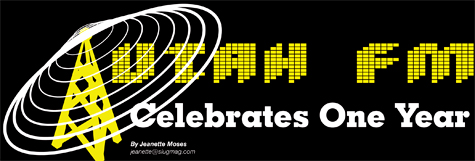Utah FM Celebrates One Year
Community

In January 2008 KRCL announced they were changing the format. After 28 years, they were canning the daytime volunteers and replacing them with three paid DJs. Community members cried foul at the station’s decision. People lamented that their beloved community station was giving itself a “corporate makeover.” Ultimately the format change wasn’t as bad as expected, and resulted in the birth of a brand new volunteer-based online radio station known as Utah Free Media.
“It was founded [because] a group of KRCL volunteers/DJs and the public [were] outraged at the Board of KRCL violating its own mission statement and core values,” says Babs Delay, Utah FM volunteer DJ. Delay was one of the many volunteers who lost their position as a result of the change. She was the host of Women: The Third Decade for 28 years––the longest-running women’s music program in the country. Although listeners have stopped tuning to 90.9 to hear her show, they can still catch her every Thursday from 9 a.m. to noon streaming on iTunes from UtahFM.org. If you aren’t near a computer at that time, you can listen to the program through the station’s new iphone application or at your own convenience through their online archives.

“Utah FM started with a phone call between Troy [Mumm] and I,” says Mike Place, co-founder and technical director of Utah FM. “From there, it grew into a loose band of volunteers. It wasn’t too long before we had studio space and donations started to come in.” The station takes up three once-vacant rooms in the basement of Urban Utah Homes and Estates. The space was donated by Delay—the Principle Real Estate Broker for Urban Utah. The technical infrastructure of the station was donated by XMission—where Mike Place works in Research and Development. “[It’s] absolutely essential in making the station work,” Place says, “We simply couldn’t exist without the support of [XMission CEO] Pete Ashdown and the rest of the group over there.”
The station launched on May 12, 2008 with “almost no money, about 20 music programs and not much else to speak of,” says Place. On their first day they had 200 unique listeners.
In the past year Utah FM has grown to include nearly 50 weekly programs (15 of which were added at the end of April), seven podcasts and, according to Place, hundreds of volunteers. “I look around and there are new faces, new hands taking on new responsibilities and we’re growing,” says Patrick Commiskey, marketing director of Utah FM. Their listenership has increased as well. “I think our average weekly listenership is now at 2,000,” Commiskey says. “I used to have a handle on these numbers, but they’ve been changing drastically over the last several months.”
Although Utah FM has grown significantly during the past year, the station continues to run on a mostly DIY ethic. “We can make $100 go further than just about any other station,” Place says. On average, Place and Commiskey each put in about 20 volunteer hours per week, no one on staff is paid and their phone flasher is made of a fire alarm strobe, a laptop power supply and duct tape.
As a community grassroots radio station, Utah FM strives to dig deep into the culture of their listeners. “[We want to] give voice to the people of Utah to create and broadcast their own content about whatever they are passionate and knowledgeable about,” Commiskey says.
“The space where community radio is at its best is when its equal part speaker and listener,” says Place, “The goal of community radio should be to make as many of our listeners into participants as we can.” This is the direction that Utah FM wants to move towards. Place says he hopes in the next year the station can relocate to a bigger space to allow the community to really come participate.
Another area that the station hopes to expand in the next year is their podcasts. Utah FM already features podcasts like Utah Stories, A Damn Podcast, Pinpoint SLC (which SLUG contributes to regularly), The Awkward Hour and a few others.“[With] Pinpoint SLC we’re picking up slack from cut arts and entertainment budgets at the Tribune and Deseret News,” Commiskey says, “[It] gives voice to the artists creating wonderful projects all around Salt Lake City.”
Tune into Utah FM at utahfm.org. If you don’t like what you hear … maybe it’s time to volunteer.
Utah FM will celebrate their one-year anniversary at Pat’s BBQ on Tuesday, May 12.
